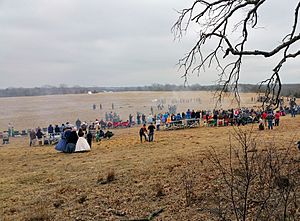Battle of Round Mountain facts for kids
Quick facts for kids Battle of Round Mountain |
|||||||||
|---|---|---|---|---|---|---|---|---|---|
| Part of the Trans-Mississippi Theater of the American Civil War |
|||||||||
 Battle of round mountain 2017 reenactment at disputed Battle site near Yale Oklahoma |
|||||||||
|
|||||||||
| Belligerents | |||||||||
| Loyal Indians | |||||||||
| Commanders and leaders | |||||||||
| Opothleyahola | Douglas H. Cooper | ||||||||
| Strength | |||||||||
| Unknown | 1,400 men | ||||||||
| Casualties and losses | |||||||||
| 110 casualties | 6 fatalities 4 wounded 1 missing |
||||||||
The Battle of Round Mountain was the first fight in the Trail of Blood on Ice campaign. This campaign was about who would control the Indian Territory during the American Civil War. The battle happened on November 19, 1861.
The main goal of this battle was to stop Native American groups who supported the Union from leaving the Indian Territory. These groups, led by Opothleyahola of the Creek Nation, wanted to find safety with Union forces in Kansas.
Historians aren't sure exactly where the battle took place. Some think it was near Keystone, while others believe it was close to Yale, Oklahoma. Sometimes, people call this event the Battle of Red Fork.
Contents
What Happened at Round Mountain?
A Leader's Choice: Opothleyahola's Stand
Col. Douglas H. Cooper was a Confederate leader in the Indian Department. He could not agree with Opothleyahola, who led a group of Unionist Creeks and Seminoles. Opothleyahola's group had about 1,700 people. They also included Union supporters from the Comanches, Delawares, Kickapoos, Wichitas, and Shawnees.
On November 15, 1861, Colonel Cooper set out with about 1,400 men. His mission was to make Opothleyahola's group join the Confederates. If they refused, Cooper was ordered to "drive him and his party from the country."
The Chase Begins
Cooper's soldiers rode along the Deep Fork of the Canadian River. They found Opothleyahola's camp empty. On November 19, Cooper learned from captured prisoners that some of Opothleyahola's people were building a fort. This fort was at the Red Fork of the Arkansas River.
Cooper's men arrived there around 4:00 p.m. Their charging cavalry (soldiers on horseback) found that Opothleyahola's followers had just left their camp. The Confederates found and followed some people who were left behind.
The Battle Begins
The 4th Texas cavalry accidentally ran into Opothleyahola's warriors. They were hiding in the tree line at the bottom of the Round Mountains. Opothleyahola's fighters pushed the Confederate cavalry back to Cooper's main force.
It was getting dark, so Cooper could not attack right away. When the main enemy force was only about 60 yards away, Cooper's men attacked. After a short fight, Opothleyahola's men set fire to the prairie grass. This created smoke and confusion, allowing them to retreat.
After the Fight
The next morning, Cooper moved toward Opothleyahola's new camp. But he found that the Union forces had already left. The Confederates said they won the battle because Opothleyahola had left the area.
The Confederates captured supplies that Opothleyahola's group left behind. These included Opothleyahola's carriage, a dozen wagons, food, cattle, and ponies. The Confederates lost 1 captain and 5 men killed, 3 seriously wounded, 1 slightly wounded, and 1 missing. Opothleyahola's group had about 110 people killed or wounded.
This was the first of three battles between Opothleyahola's Union-supporting groups and Confederate troops. The Unionists were eventually forced to escape to Kansas. This happened after the Battle of Chustenahlah at the end of that year.
Important People and Groups
Confederate Side
The Confederate forces were led by Col. Douglas H. Cooper. His group included:
- Companies from the 1st Regiment Choctaw-Chickasaw Mounted Rifles
- Parts of the 1st Creek Mounted Rifles
- Parts of the 2nd Creek Mounted Rifles
- A group of Seminole Indians
- A group from the 9th Texas Cavalry
Union Side
The Union-supporting Native American groups were led by Opothleyahola. His forces included:
- Lockapoka Creeks
- Muscogee Creeks
- Seminoles, including leaders like Halleck Tustenuggee and Sonuk Mikko
Images for kids
 | Jewel Prestage |
 | Ella Baker |
 | Fannie Lou Hamer |


